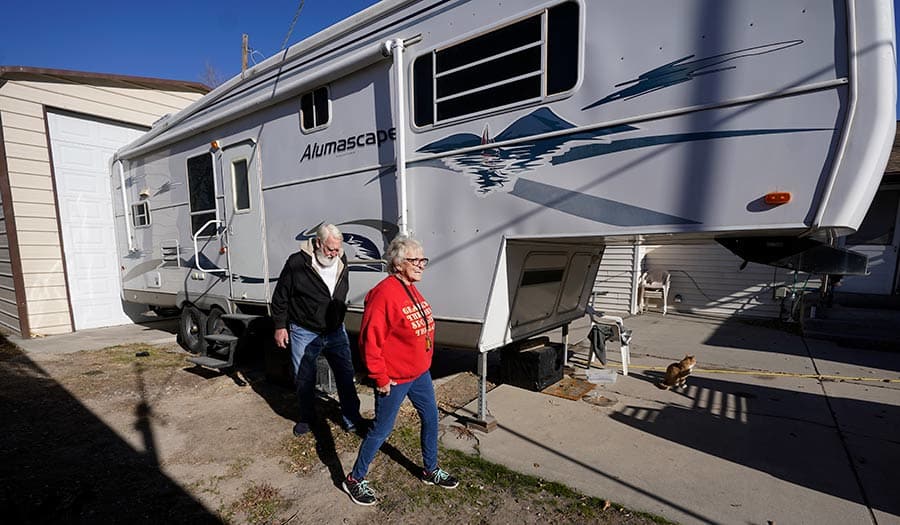 AP/Rick Bowmer
AP/Rick Bowmer
World News Desk
Learn the why behind the headlines.
Subscribe to the Real Truth for FREE news and analysis.
Subscribe NowPHOENIX (AP) – This is the first winter in five years that Steve Monk and his wife, Linda, have not driven to Arizona from their home in Prince Albert, Saskatchewan.
They typically leave Canada to hunker down in warmer climates for six months. They could fly, skirting travel restrictions at the border, but they would rather “freeze” than go to the U.S., where COVID-19 infections and deaths are surging.
“It’s not worth taking a chance. It’s not nearly as bad in this country as it is down there,” said Mr. Monk, 69. “Pretty much every Canadian person we do know that goes down [to the U.S.] is not going.”
“Snowbirds” like the Monks, often retirees who live somewhere warm like Arizona or Florida part time to escape cold weather, will not be flocking south this winter. For Canadians who drive, nonessential border travel is banned until at least December 21. For some, it is fear of the virus.
While their absence is being felt by vacation rentals, restaurants and shops, RV parks and campgrounds are seeing an increase in campers as people travel closer to home.
A huge chunk of the snowbird population is Canadian. Evan Rachkovsky of the Canadian Snowbird Association said most people he has spoken with are suspending trips to the U.S.
But some are still adamant about going.
“Some tell me just simply this is something they’ve been doing for 10, 20, 30 years, so it’s habitual in that sense,” Mr. Rachkovsky said. “It’s a lifestyle as opposed to vacationing for two weeks.”
For those who go, they may face recommendations to quarantine for up to two weeks, though states often do not enforce it. They are also going into communities where hospitals are normally busiest during the winter months, and COVID-19 could overwhelm them.
Health insurance hurdles are deterring retired Toronto accountant Mel Greenglass, who for almost a decade has spent four months in southwest Florida near Naples. Canadian snowbirds must buy a supplemental plan to their government-provided coverage for any emergencies during their stay. It would have been $2,800 for him and his girlfriend this season, up from $1,800 previously, and he feared they would not be covered if they caught the virus.
Insurers “are not going to lay out a lot of money to cover everybody just by raising their premiums a little bit,” said Mr. Greenglass, 78. He added that adapting to the Canadian winter will not be easy: “I don’t even own a pair of boots.”
It is easier for those who do not have international borders to cross. Kathy Scott, 73, and her 81-year-old husband intend to make their annual drive from Salt Lake City to Arizona after Christmas.
Snowbirds’ plans have a huge impact on tourism. In Florida, 3.6 million Canadians visited last year, making up a quarter of its foreign tourists, according to the state tourism office. Visit Florida estimates that only 15,000 Canadians arrived between April and September, the last month with available statistics. That is about a 99 percent decrease from the same period last year.
The Arizona Office of Tourism said an estimated 964,000 Canadian visitors were responsible for $1 billion of the $26.5 billion in tourism spending last year. In September, visitors overall spent $752 million, down 60 percent from the $1.9 billion expected in a normal year.
Becky Blaine, the office’s deputy director, said it helps that many people are looking closer to home for vacation. But that will only go so far to offset the loss of international visitors. She is also not sure how much of a boost RV parks and campgrounds will get.
“Now that kids are back in school though, it would be more of that retiree population versus over the summer when everybody rented RVs, including myself,” Ms. Blaine said.
Bobby Cornwell, executive director of the Florida and Alabama RV Parks & Campground Association, believes it is not “all doom and gloom” for his industry. Snowbirds make up 30 percent of the business for Florida’s RV parks, he said. There have been cancellations, but park operators are seeing people of all ages road-tripping.
“From the people we’re getting feedback from, many of our parks throughout the whole state, for every cancellation, there’s one or two campers who come in,” Mr. Cornwell said. “I haven’t heard of anything disastrous.”
Bruce Hoban, co-founder of the 2,000-member Vacation Rental Owners and Neighbors of Palm Springs, said property managers who rent condos to snowbirds for two- to three-month stints in the desert resort city are having a hard time. But vacation rentals for stays under 30 days have been “through the roof.”
Normally, rentals generate 25 percent of the $25 million Palm Springs rakes in from an occupancy tax. They are now generating 50 percent. Between vacation rentals and hotels, the city did 5.5 percent more business between July and September compared with the same period last year.
“It’s a big shift,” Mr. Hoban said. “The amount of people coming on vacation rentals was like nothing we had ever seen…Yes, we lost two-and-a-half months of what is normally our most expensive, highest time of the year because of Coachella festivals and stuff. We lost all that. We have more than made up for it since then.”
More on Related Topics:
- What to Know About the Supreme Court Ruling on Tariffs
- Credit Scores Decline for Millions as U.S. Student Loan Collections Restart
- With Retail Cyberattacks on the Rise, Customers Find Orders Blocked and Shelves Empty
- Why Are More Shoppers Struggling to Repay ‘Buy Now, Pay Later’ Loans?
- Moody’s Cuts America’s Pristine Credit Rating, Citing Rising Debt


